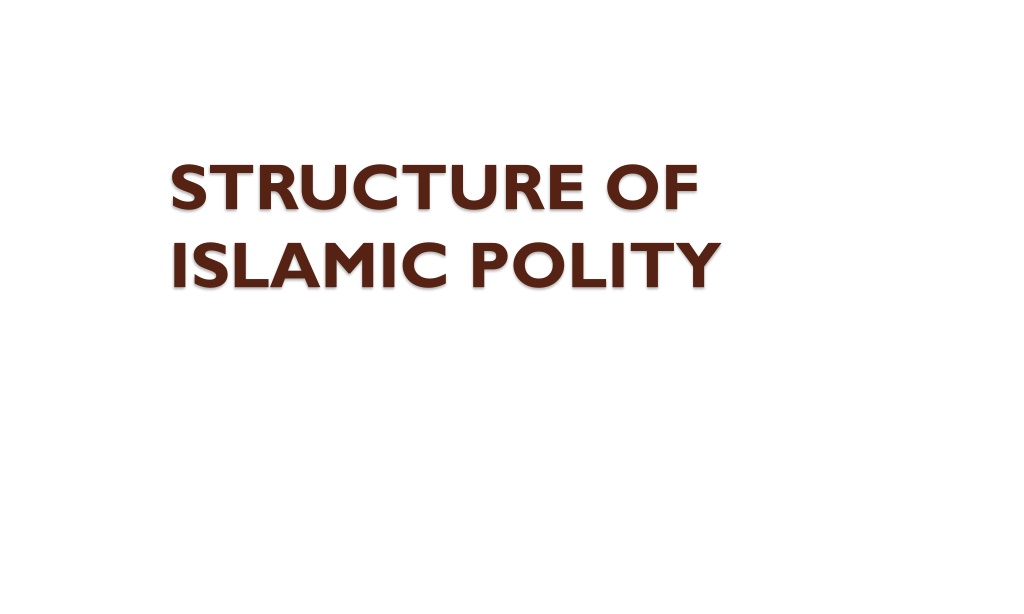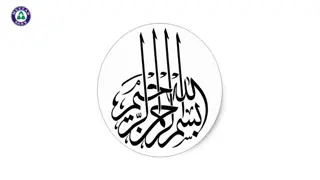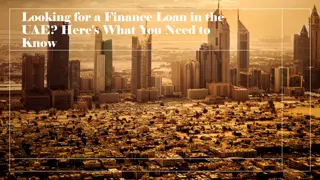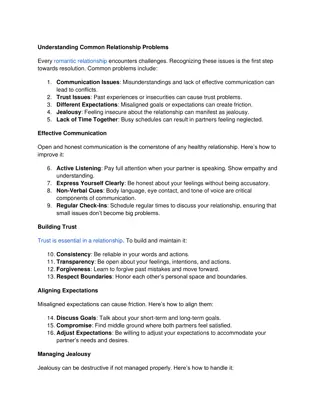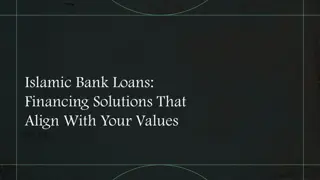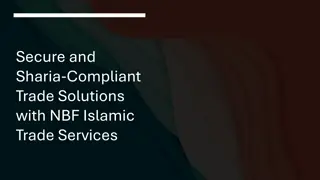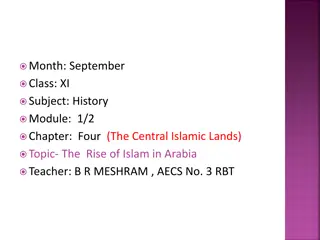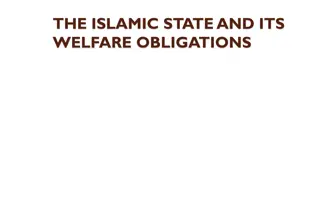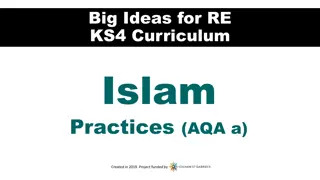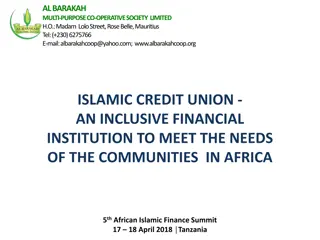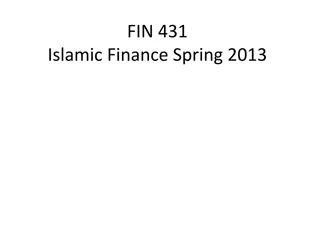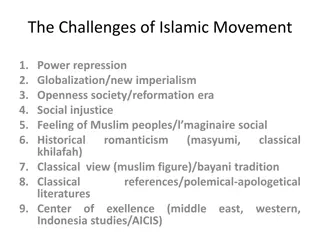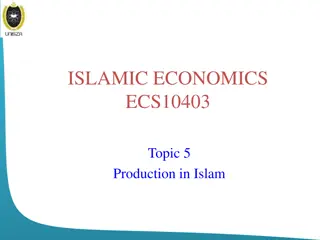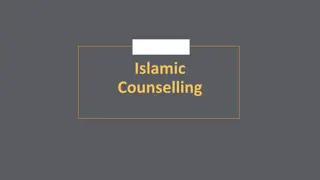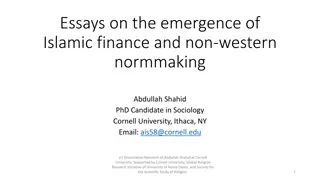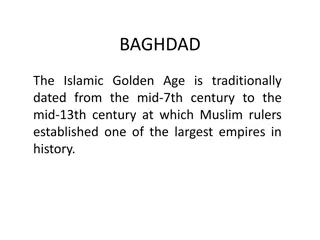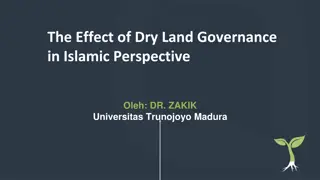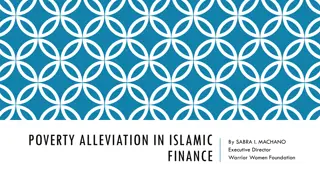Understanding the Structure and Role of Islamic Polity in Governance
The Islamic polity entails a particular form of government with its own political authority, power, and capacity to enforce laws and rules. Within an Islamic state, the role of the government is seen as instrumental in achieving the spiritual and material well-being of individuals, as highlighted in the Quran. The justification for power and authority in Islam is rooted in the exercise of these values within an Islamic state.
Download Presentation

Please find below an Image/Link to download the presentation.
The content on the website is provided AS IS for your information and personal use only. It may not be sold, licensed, or shared on other websites without obtaining consent from the author. Download presentation by click this link. If you encounter any issues during the download, it is possible that the publisher has removed the file from their server.
E N D
Presentation Transcript
STRUCTURE OF ISLAMIC POLITY
Polity: particular form of government
Government: political authority: a group of people who have the power to make and enforce laws for a country or area
Power capacity to do something the ability, strength, and capacity to do something
Authority: right to command: the right or power to enforce rules or give orders
Right: morally justified and correct, or consistent with generally held ideas of morality and proper conduct Justified: having an acceptable reason for the action taken
particular form of government a country or nation with its own sovereign independent government political authority a group of people who have the power to make and enforce laws for a country or area capacity to do something something right to command the right or power to enforce rules or give orders a particular form of government that exists within a state Polity State Government the ability, strength, and capacity to do Power Authority morally justified and correct, having an acceptable reason for the action taken or consistent with generally held ideas of morality and proper conduct Right Justified Islamic Polity: Islamic form of government within a state
Role of State in Islam Islam or the Quran denounces and condemns disorganization and anarchy (Al-Quran, 2.205). Islam sees the role of the state as instrumental in the realization of the goals and ideals in pursuit of the spiritual and material well being of human being.
Justification for Power and Authority in Islam The exercise of powers and authority, in an Islamic state, derive from the trust of Allah, who has ordered their exercise in accordance with the terms and conditions of the trust laid down in the Islamic law orShariah.
The two important terms of this trust are that the state should be; 1. Democratic and 2. Welfare oriented These two terms explain the political and economic system of Islam and the principals on which an Islamic state / society can be established.
Structure of the Islamic polity In order to realize the human welfare as goals of the Islamic system, it prescribes a political structure which become instrumentalin the catering of welfare services.
These principles of the political structure of Islam, are described as below;- 1. Sovereignty of Allah 2. Vicegerency of Man 3. Establishment of Shura 4. Accountability 5. Judiciary / Maintenance of Law & Order 6. Freedom
1. Sovereignty of Allah Sovereignty means unlimited powers over citizens and subjects, unrestrained by law [1]. this power is by its nature absolute*, perpetual**, and indivisible and resides not in the whole state but in the body of the citizenry in democracy , in the state of nobility in an aristocrat , and in the person of a king in a monarchy . *Absolute: Unlimited, Full and Unconditional Always True **Perpetual: Ever lasting This means any authority which is independent of any other authority. Indivisible: Not separatable [1] Norman D. Palmer & Howard Perkin, 1953, International Relations. USA..p58.
Sovereignty is the collection of powers and jurisdiction. It is the authority which is comprehensive, permanent, indivisible and original in exercise of powers to give laws and, others are bound to obey such laws*1. The word sovereignty is derived from the Latin word Superanus which means the supremacy of one over other, the highest, the final and absolute power. Absolute: full and unconditional *1Aatir Rizvi, (2010) Muslim Law and jurisprudence ( Lahore: Niaz Jehangir Publishers ),Pp.71-77.
Islam and sovereignty Al-Maida,(5;2), Al- Anam (6:57), In Islamic polity Sovereignty means the source of power is Allah. He gives life and death. He is the owner of the Universe. He is the master of the day of resurrection. All praises are to Him. He is mighty. He is all powerful. The word Aziz in Quran means unchallengeable authority and there is none in the entire universe who can challenge the authority of Allah. He is answerable to no body. No body can question him for His acts. The Quran time and again reminds us this fact[1]. Al-Araf (7:54) al- Mumeno on(23;88) [1] Al-Quran Al-Maida,(5;2), Al- Anam (6:57), Al-Araf (7:54), al-Mumenoon(23;88), Al- Furqan (25:12), Al-Hashar ( 59:23), Al-Mulk etc
In case of Islamic democracy man has no direct authority to make laws for fellow men or the creation of God but is to implement the laws already prescribed by Him for His creation. If man makes laws, they would be in accordance with the laws of Allah.
Thus the sovereignty of Allah implies the rule of the divine laws as revealed by Him to the Holy prophet Muhammad (PBUH). Quran time and again reminds us that;- He has commanded that you obey none but Him that is the right path. ( Al-Quran, Al-Yousaf, ,40) and those who do not make decisions in accordance with the revealed by the God, are in fact the unjust (Al-Maida, 45).
The characteristics of Allahs Sovereignty are mentioned in few of His 99 names as 1. Al-Wahid (the one) 2. Al-Qahar (the mighty) 3. Al-Ahad ( the only one) 4. Al-Malik ( the master) 5. Al-Qayum ( The eternal) 6. Al-Jabbar (The supreme) 7. Al-Fatir (the creator) 8. Al-Aziz ( un-challangable)
West and sovereignty As a result of the difference in the concept of sovereignty between Islamic politics and the western politics, Islamic laws differ from the western laws. There is a difference between the two types of democracies on the basis of the principles on which they are based. In the case of the western democracies people have the absolute authority: laws are made and promulgated according to their wishes and thinking. Rights and wrong are determined by the people and the political and legal processes. Politics and religion are segregated from each other.
Types of sovereignty Sovereignty has two types namely Legal and political sovereignty. Both are interdependent and cannot be separated from each other like two faces of the same coin. Legal sovereignty does not mean any thing in its self if political sovereignty is not there at its back.
Similarly, Allah s sovereignty has two parts legal political. The legal sovereignty of Allah means that Quran and the Sunnah of the holy prophet Muhammad (p b u h) are the supreme laws of the Islamic state and no other law can supersede it.
The practical form of the legal sovereignty of Allah is the apostles / prophets and his representatives. Allah has never spoken to people directly but communicated His commands through chosen persons- the prophets who are contacted by Him through the angel Gabriel (AS) through whom people come to know what are Allah s commands and what are not.
The difference between Islamic and western concepts of sovereignty Islam & Sovereignty 1.Sovereignty vests in Allah. 2.The concept is laid down in Quran 3.Sovereign here has unlimited powers 4.No restriction on sovereign 5.The concept is unique 6.there is no ambiguity West & Sovereignty 1.Either one man or group of people as the case may be. 2.Defined by different philosophers 3.Limited powers. 4.certain restrictions 5.still in evolution, not complete. 6. different philosophers and approaches made it confusing
2. Vicegarency of man on the earth. Man is the vicegerent* of Allah on the earth[1]. Man is the representative (Khalifa) of God on the earth. It is not the job of a representative to make or abrogate laws of his sovereign. The duty of the vicegerent has always been to conduct all affairs in accordance with the will of his superior . He cannot do anything with his own free will. *a deputy appointed to act on the authority of a ruler or magistrate, especially in administrative duties [1] Al-Quran (2-30) Allah said to the angels, I will create a vicegerent (Khalifa) on the earth, and 6: 165 ( al- Anam, it is He who made you His agent , inheritors of the earth.
He cannot ignore the commands of his superior. The political sovereignty of Him is implemented by His agents or human beings those who are charged with the implementation of His laws like prophets, caliphs and Khilafat. Quran calls this representation as khilafat[1] If human beings do not obey the orders and directives of the sovereign, they are no longer representatives but rebels and wrong doers. [1] (Al-Quran 2:30)
Quran emphasize obedience to Allah, His apostle, and those charged with authority among the Muslims[1].They must run the affairs of the people in the light of the teachings of Shariah (Islamic laws). Rulers who budge even an inch from this defined line of conduct, are not to be obeyed, as obedience has been made conditional[2] [1] ( Al-Quran, 4;59) [2] Ibid.
They must follow the Shariah in running and conducting the affairs of the state or they lose their authority. This point needs clarification that those charged with authority does not mean rulers only, but also those assigned any responsibility in Muslim society, such as teachers, parents, judges, officers and scholars.
3. Shura or Parliament Consultation is the most important and main function of Islamic polity. The idea of a pure democracy is the hallmark of Shura in Islamic state structure. Shura is an Arabic word which means mutual consultation. Status of Shura or Parliament is established by Quran[1]. Shura is the body consisting of representatives of Muslim community, who assemble for consultation with each other to reach decisions , for running the government. Making any political decision in an Islamic state is the jurisdiction of the Shura. [1] Al-Quran (al-Shuara, 42;38)
The rulers of an Islamic polity will be elected or selected by the parliament which can be reflected in referendum, national assembly, house of representative, a senate or Mijlas-i-Shura. [1] Al-Quran (42;38)
Qualities of shura Shura is the caretaker of public interest. Shura is essentially a guardian of Quran and sunnah. It must act in accordance with the needs of Islamic society. It is a symbol of Muslim brotherhood. It is a bridge which enjoins the public with the government. It is reflection of peoples superiority over the government. Shura acts as a check on the powers of the head of state, It is the center of the Islamic political system 1. 2. 3. 4. 5. 6. 7. 8.
4, Accountability responsible to somebody or for something In Islam every person is accountable for his own deeds. No body can bear the burden of another body says the holy Quran[1]. [1] Al-Quran (Al-Fater, 35:18)
The Prophet of Islam said You should remember that every one of you is a responsible person and will be held accountable for his subordinates, and that any man whom Allah has given any authority of ruling some people and who do not look after them in an honest manner, will never feel even the smell of paradise [2]. [2] Muhammad bin Ismail Bukhari, Al Bukhari. Vol IX . Translated by Muhammad Mohsin Khan, 1984,Kitab Bhawan, New Delhi. P.197-264.
In an Islamic state appointment to any post is a responsibility and not a privilege. Accountability in Islam is so central that a father and mother have been made accountable and responsible for the well being of their children. An officer will be responsible for the welfare of his subordinates and a ruler for the welfare of his subjects.
Every office bearer is a guardian and a patron, and in this sense authority and official status represents public trust* and it is for the ruler to assign all responsible posts to those who are capable of managing that trust. *confidence in and reliance on good qualities, especially fairness, truth, honor, or ability
Similarly, the public should assign the responsibility of running the state affairs to those who are trustworthy, efficient and God fearing. appointment to any responsible post is a responsibility and not a privilege.
5. Judiciary /law and Order maintenance (Protection of life, property and honor). Protection of life, honour and property of each and every citizen is a universally recognized function of any state irrespective of its nature, but Islam puts special emphasis on this and introduced exemplary punishments to safe guard the property, life and honour of every citizen irrespective of caste, colour and creed.
This function of the state has far reaching implications and is the major determinant of socio-economic and political prosperity and development. Islam gives full protection to the life of every person, has forbidden killing, humiliation or insult of other human beings and terms killing an individual without just cause as killing the entire humanity [1]. [1] Al-Quran (5;32 and 4:93)
It is the responsibility of the state to punish the culprit and/ or compensate the heirs of the murdered person.
The holy prophet said that it is forbidden to perpetrate atrocity upon a Muslim to humiliate him, to insult him, and inviolable is his blood , honour and wealth [1]. On the occasion of the last pilgrimage to Makkah, known as Hajatul Widaa, or the last Haj, the holy prophet (pbuh) gave an address which is the first Magna Carta of Human Rights and equality in history, said that Allah has made your blood, your property and your honour as sacred as this day of yours as this city of yours [2]. [1] Muslim bin Al-Hajaj Al-Nisaburi,Saheeh al Muslim Vol.IV. Translation by Abdul Hameed Siddiqui). [2] Muhammad bin Ismail Bukhari, Al-Bukhari Vol. III. Translated by Muhammad Muhsin Khan ) Kitab Bhawan New Delhi. Pp.510-11.
Stealing or taking money or property by force have been declared by Islam as punishable crime. Those who steal other s property other than under any genuine and basic need of hunger or as a result of mental abnormality will be punished by having their hand chopped; and those who take the life and property of others by force, will be punished by being put on gallows and having their hands and legs chopped off. After such an incidence in public no one will dare to commit such crimes against persons or properties.
Honour is protected in the same way. Adultery by men or women is punished by death as a woman whether a wife, sister or daughter or mother, is also an honour of some one. This penalty is inflicted only if the complainant could provide four authentic witnesses to the occasion, however, and this is difficult if not impossible.
6. Freedom^ Freedom means the enjoyment of civil liberties*. Islam recognizes all liberties of an individual subject to the condition that it will not curtail or undermine the liberties and rights of others. The concept of freedom may differ from society to society and time to time but a general consensus is that it is best expressed as the phrase rulers should not tyrannize^^the ruled . *right to choose ^^to govern a people or community with extreme cruelty and harshness ^ability to act freely
Today, the term is taken more in political sense than any other, and in the political context this freedom refers to 1. freedom of thoughts and beliefs, 2. the freedom of speech, 3. the right to fair trial and 4. equal access to justice and legal system. Personal freedom further includes the right to life, liberty, privacy, security, and freedom of movement. Today, freedom of thoughts and belief is at the root of all those types or branches of freedom which Islam deems most important.
In an Islamic state every citizen is allowed to adopt any political or religious dogmas. In the field of religion or dogma Islam commands its followers not to compel any other person to convert[1]. What is happening in the Muslim countries today, is not always based on Islamic laws and it is unwise to judge Islam by the behavior of the Muslims or their way of life; rather it is proper that their way of life be judged in accordance with the Islamic ideals. [1] Al-Quran (2: 256)
Islam also safeguards the freedom of association of every individual, and does not interfere with his choice of association unless his association with such an association is not in conflict with general welfare, so leading to disorganization1. Similarly, freedom of speech if it does not incite public sentiment and cause violence, is allowed, as is freedom of movement from one place to another. [1] Al-Quran (Al-Imran) 3: 104-5. let there arise out of you a band of people inviting to all that is good and , enjoining what is right ,and forbidding what is wrong. They are the one to attain felicity.
